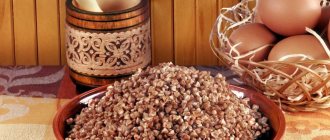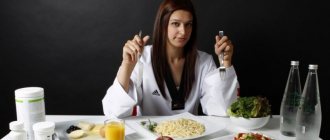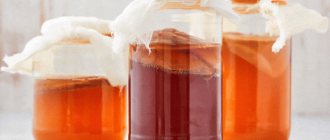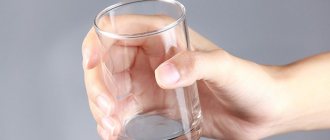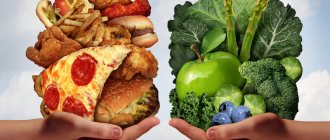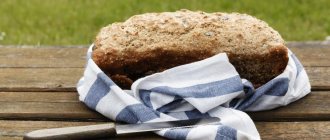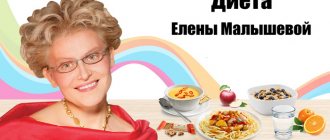Nutrition for cancer cannot cure the disease, but it can interfere with treatment or help it and bring pleasure to the patient's life. We are used to eating as we like and as much as we want, which is not good for health, just like eating something we don’t like at all. In case of a serious illness, it is especially important to find a balance between useful and pleasant.
- The goal of proper nutrition
- Anti-cancer products
- Contraindicated foods for cancer
- Nutrition rules
- Dietary features for different types of cancer
- Features of diets after surgery
- Features of diets after chemotherapy
- Vitamins
- Preventive nutrition
The goal of proper nutrition
Proper or rational nutrition is the timely consumption of foods that are balanced in composition, not only covering the need for energy and “building” substances, but also bringing objective benefits, that is, not precipitating diseases and partly preventing them.
Products of poor quality can cause diseases of the gastrointestinal tract and all important systems, which has been proven by the example of cardiovascular pathology, aggravated by excessive consumption of cholesterol-rich foods.
Proper nutrition is healthy because it helps a person to be physically active due to resistance to disease and optimization of physiological processes, it should:
- provide optimal energy needs, that is, without excess going to the formation of fat deposits;
- reduce the level of the poorly functioning fraction of cholesterol and do not increase total cholesterol above that required for the synthesis of hormones;
- maintain the structural composition of bone tissue and teeth with a sufficient amount of calcium; as is known, non-food calcium in tablets is poorly absorbed;
- do not contribute to the development of certain forms of intestinal malignancies.
Each product we use has a certain nutritional value and taste, but only functional ones - healthy ones also have a beneficial physiological effect on the body. Of course, attaching special importance to the medicinal properties of food is overly optimistic; in reality, there is no food that can replace even the simplest medicines.
For cancer patients, positive nutrition not only provides pleasant satiety and taste pleasures, but should help them survive complex specific treatment, without shortening their life with constant hunger or spoiling it with a sudden exacerbation of chronic diseases.
Book a consultation 24 hours a day
+7+7+78
Dr. Moerman and his nutrition system
Currently, one of the popular, and most importantly effective, nutritional systems is the Moerman anti-cancer diet.
Dr. Moerman worked and lived in the Netherlands. Throughout his long life - and he lived for 96 years - he fought for the lives of people suffering from cancer. Hundreds of people were saved by him. Having studied the method that Moerman used, it turned out that out of 150 patients with oncological pathology who were treated by him, 115 were completely cured.
Dr. Moerman's diet was not initially recognized by representatives of the medical community and was even criticized. It seemed to them that the method of preventing and treating cancer was too simple and primitive. Unfortunately, not everyone remembers that everything ingenious is simple.
Moerman persistently went about his business, healing even the most hopeless patients whom doctors had already refused to treat. And, in the end, he managed to receive well-deserved recognition from society. In 1987, the Moerman anti-cancer diet was officially recognized and approved by the Ministry of Health of the Netherlands as one of the methods for the prevention and treatment of malignant neoplasms. The famous scientist, two-time Nobel Prize winner, L. Polling also actively supported the Moerman diet as one of the unique methods of treating cancer.
Anti-cancer products
The development of a tumor is the result of a whole complex of long-term disorders in the body in the form of the consequences of long-term chronic inflammation and random mutations, combined with genetic predisposition, environmental influences and harmful occupational exposures. Calling food anti-cancer is an exaggeration with good intentions, because even a simple disease cannot be cured with the right food, but this food group helps reduce the influence of factors leading to malignant degeneration of cells.
One food set has a good effect on the condition of, for example, the mucous membrane of the gastrointestinal tract, but is not at all positive for blood vessels, since not all food elements are equally optimal for a variety of tissues and biological processes. However, dietary elements can reduce the likelihood of cell damage.
Experimental studies have proven the positive effect of dietary fiber on the likelihood of developing carcinoma of the breast, uterus and colon, because sufficient dietary fiber content in food:
- requires intensive chewing, during which a sufficient volume of fermented digestive juices is produced for digestion, protecting the gastric mucosa from mechanical damage from dry pieces;
- irritation of the mucosal receptors by the coarse fiber structures allows the intestinal tube to pass faster, minimizing the contact of cells with food carcinogens;
- fiber promotes quick satiety, reducing consumption and preventing obesity, one of the risk factors for cancer.
Bran, legumes and soybeans are rich in fiber; the latter also contain polyphenols with a clear anti-cancer effect, which explains the low incidence of these tumors in residents of the Asian-Far Eastern region. Africans are less likely to suffer from intestinal carcinomas, since predominantly plant foods do not stay in the body for more than 4 hours.
Cabbage and radishes, onions and garlic contain sulfur compounds that reduce the likelihood of malignant diseases. Citrus fruits are rich in antitumor monoterpenes. All green crops whose leaves are rich in chlorophyll, vitamins and microelements have a beneficial effect on the health of mucous membrane cells, preventing the development of malignant ones.
The acids contained in polyunsaturated fats immobilize cancer cells, so Europeans and Japanese who consume olive oil, fish and seafood are less likely to suffer from breast carcinoma, and the fatty meat of marine life protects women of northern peoples from breast cancer.
All healthy foods that have a positive effect on the body contain dietary fiber and some vitamins, polyunsaturated fats and minerals, antioxidants and live probiotic microorganisms, as well as the prebiotic sugary substrate necessary for the life of beneficial microflora.
TWO IMPORTANT ASPECTS IN THE NUTRITION OF SICK PEOPLE
Cornelius Moerman approached the very complex problem of cancer from a nutritional point of view. And he achieved amazing results. Dr. Moerman's diet therapy includes:
- firstly - the basis of nutrition - fiber, vitamins and minerals;
- secondly , he recommends taking 8 vitamin and mineral supplements necessary for the body.
Moerman's diet therapy can be used as an addition to the main methods of oncology therapy, immunotherapy, and also as an independent method for the prevention of cancer and recovery of the body after the main treatment.
Dr. Moerman's therapy destroys the soil necessary for the existence of a cancerous tumor, creating an environment hostile to cancer cells, which at the same time provides a valuable nutrient medium for healthy cells, creating a balanced acidic environment. This therapy starves and suffocates cancer cells while promoting health.
Contraindicated foods for cancer
There is no list of foods contraindicated for malignant diseases; every cancer patient can eat what he wants and when he likes. A cancer patient should know where food carcinogens are found and what, at the microscopic level, helps the malignant tumor resist special treatment.
Meat is number one in terms of proven harmfulness because:
- During the growth of an animal, hormones are used that help proliferation - increasing the size of the cell population and, accordingly, increasing the size of the carcass; not all hormones have time to be utilized to zero.
- Cattle on grazing eat grass, which is not always free from mineral fertilizers and herbicides, which accumulate in small concentrations in animal cells.
- Animals also suffer from infections, so antibiotics are used to keep the livestock healthy.
- When preparing meat dishes - smoking and frying, carcinogens are formed, which have a pleasant taste and tenfold increase the frequency of mutations in the cells of the gastrointestinal mucosa.
- The meat is riddled with streaks of unsaturated fat, which contributes to cancer risk factors such as excess weight and chronic atherosclerotic vascular inflammation.
- It is impossible to completely rid meat of blood cellular elements, and iron in hemoglobin is carcinogenic to the intestinal mucosa, contributing to the appearance of adenomas and polyps.
- The decomposition of eaten meat into chemical components inside the cellular apparatus of the digestive system leads to the formation of precursors of carcinogenic products.
Alcohol is the second most harmful to the human body, but only in excess:
- Ethyl alcohol damages liver cells resulting in cirrhosis and fibrosis, against which the incidence of liver carcinoma increases by an order of magnitude.
- Alcohol degradation of liver cells - hepatocytes - leads to a decrease in the overall antitoxic function of the organ, helping carcinogens circulate freely and in significant concentrations in the bloodstream.
- Alcohol in the body decomposes to acetone, a carcinogen precursor.
- Alcohol helps to quickly absorb carcinogens from food.
- Alcohol interferes with the absorption of folic acid by the gastric mucosa, thereby disrupting the functioning of immune cells and inhibiting the synthesis of hormones by the sex glands, and so on.
The third unfavorable factor in helping carcinogenesis is tap water:
- Water is contaminated at the source and pipes with direct carcinogens - nitrates and mineral fertilizers diffusing from the soil.
- In old water pipes it binds to free iron, which actively harms the intestinal mucosa.
- Chlorine, which purifies water from microorganisms, already becomes a mutagen inside the human body.
Not all is well in plant foods either; excess nitrates can accumulate there, the metabolites of which form carcinogenic compounds inside human cells. And such table salt, beloved by mankind, increases vascular pressure - a risk factor for malignant cellular degeneration.
At first glance, there is not so much junk food, but the daily diet of the vast majority of Russians cannot do without it; many people choose this food set as their main one.
Two stages of the anti-cancer diet
This power system is divided into 2 parts. The daily diet should include at least 300 g of buckwheat. Meals are carried out fractionally, so the total amount of cereal is divided into 5 - 6 small portions. Drink plenty of water; in addition to plain water, you can drink herbal teas. For example, mint, chamomile, green, linden, with ginger and fireweed.
The process of preparing buckwheat porridge is important in the diet. Half a glass of cereal should be poured with two mugs of water and cooked for a third of an hour. After about 15 minutes, add a tablespoon of wheat bran. When the porridge is cooked, pour in 2 tablespoons of olive oil, preferably cold-pressed.
In both stages, it is very important to follow the recommendations and not deviate from the established rules.
Nutrition rules
There are only four rules for a rational and absolutely healthy diet:
Firstly, you need to eat in moderation, that is, absorb exactly as many calories as will be spent on life, because the excess energy received will not go anywhere, but will end up as fat deposits. Regularly growing adipose tissue interferes with movement, helping obesity-related diseases flourish, helping and charging carcinogenesis. To reduce calorie content, energy-rich meat is replaced with vegetables and fruits, and at the same time the intake of carcinogens from meat dishes is limited.
Secondly, it is advisable to maintain a balance of macronutrients, that is, proteins, fats and carbohydrates, and micronutrients - vitamins and microelements, not forgetting about ballast in the form of various dietary fibers. This also includes limiting salt and alcohol.
Thirdly, the eating schedule is sacred, you can’t eat once or twice a day, you need even intervals between meals, which allows you to eat five times and gives you a 12-hour break at night.
Fourthly, an individual approach to compliance with the first three canons of proper nutrition, that is, in accordance with the physical activity available due to health and age.
The principle of menu construction
The menu for patients with cancer who adhere to the Moerman anti-cancer diet is approximately as follows:
- The first breakfast consists of freshly squeezed juice from one or two oranges and one lemon. Sandwich with butter and cheese. The bread should be made from wholemeal flour. The second breakfast option could consist of oatmeal with fruit plus green tea. Porridge should be prepared with skim milk.
- The second breakfast consists of beetroot-apple juice and various fruits.
- For lunch, skim milk with beaten egg yolks (1-2), buttermilk and 1 glass of grapefruit juice, wholemeal crackers are served.
- Dinner consists of soup made from whole peas, wholemeal bread, fruits, vegetables, buttermilk and bio-yogurt containing only lactic acid.
- A late dinner can be buttermilk with lemon juice, and warm skim milk at night.
When using the Moerman diet, it should be taken into account that there are foods that are recommended to be used as food, and there are those that must be avoided.
Dietary features for different types of cancer
Even 25-30 years ago, out of four patients operated on for gastric carcinoma, one patient died within a month after surgery. He died not from complications of the operation or from suddenly appearing metastases, but due to global metabolic disorders acquired even before the start of treatment. Carcinomas of the gastrointestinal tract, from the oral cavity to the rectum, reduce the supply of essential substances to the body due to swallowing disorders, nausea and vomiting, insufficient enzyme production and malabsorption. Today, postoperative mortality is minimal due to adequate preoperative preparation, taking into account the initial nutritional status - the patient’s weight and the content of proteins and microelements in his blood.
In cancer patients, there is a high breakdown of their own proteins, but more glucose is produced than required, so the tissues get used to its excess, do not actively respond to fluctuations in its concentration and are little sensitive to insulin levels. With an active malignant process, many patients develop a kind of latent diabetes mellitus that allows the patient to easily fall into hyperglycemia and hypoglycemia.
With pancreatic and lung cancer, energy consumption, which is drawn from one's own muscles, increases sharply. In addition, fats consumed by cancer cells as fuel oxidize much faster, and glucose, the main source of energy for a healthy person, is not in demand. Therefore, it is impossible to find well-fed people among the sick; exhausted people, with poor resistance and unstable to the hardships of treatment, prevail.
In case of cancer and after special treatment, there is an urgent need for more caloric foods and “building” proteins. If all nutritional elements are in abundance, then there is no vitamin deficiency.
Book a consultation 24 hours a day
+7+7+78
Nutrition for pancreatic cancer
A patient with unoperated pancreatic cancer or metastases has all his food “burnt up like a firebox,” without leaving even a gram of subcutaneous fat, and is characterized by an emaciated appearance. Clinical manifestations of pancreatic carcinoma include anorexia, frequent nausea and sometimes vomiting.
A frequent companion to pancreatic cancer is jaundice due to compression of the common bile duct by a cancerous conglomerate with an obligatory component in the form of liver failure of varying severity that progresses without treatment.
In case of pancreatic cancer, the need for high calories, but the insufficiency of the synthesis of pancreatic enzymes and the interest of the liver limits the variety of the menu.
- For meat, lean varieties and parts of the carcass are preferred: turkey and chicken breast, carb and pork tenderloin, rabbit and some veal. Lamb is not allowed and beef is not recommended.
- Low-fat fish, that is, trout, but not salmon; you can have cod, hake, pollock and seafood.
- Dairy products are better in the form of fermented milk, because they suppress peristalsis less and do not contribute to gas formation.
- Vegetables are eaten taking into account gas formation, that is, legumes are not the best choice, cereals are preferable. Fruits are selected by analogy.
- Bread is allowed, white rolls and pastries are prohibited.
- Thermal processing of food: boiling, steaming and baked.
With jaundice, the diet is consistent with liver restrictions, but during this period there is no appetite; as a rule, all the necessary nutrients are supplied with droppers and special mixtures.
A diet that is correct and adequate to the needs of the body should only be prescribed by a specialist nutritionist working in an oncology clinic, and only after tests.
Nutrition for prostate tumors
The main contingent of patients with prostate cancer are elderly men with a set of acquired chronic diseases and low physical activity due to age and due to predominant metastasis to the bones.
Prostate cancer has a reputation as a non-aggressive and slow-moving process, which, as a rule, has little effect on the patient’s appearance. Exhaustion is atypical even in an advanced stage, unless chronic diseases of the gastrointestinal tract lead to it.
By and large, there are no prohibitions for prostate cancer if there is no hypertension and cardiac pathology, diabetes mellitus and metabolic syndrome.
Calorie content corresponds to age needs and actual physical activity. Without excessive abundance in volume, but with a variety of dishes.
Due to your age, you should not abuse fatty and meat dishes, smoked meats and spices, or lean on calcium-rich foods, thereby developing urolithiasis.
You should not think that in case of prostate cancer there is no particular need to consult a nutritionist; it is precisely the abundance of pathologies associated with cancer that requires individual nutrition and a strict menu.
Nutrition for liver cancer
Anorexia and nausea are associated with hepatocellular carcinoma and metastatic liver disease. The biochemical analysis of the blood of such patients is replete with red marks with significant deviations from the norm. The patients are exhausted, but cachexia can be hidden by edema, including total and with effusion into the abdominal cavity.
The diet should not just be rich in proteins, but additionally enriched with them, often combined with protein solutions injected drip into a vein.
The dietary regimen for a liver cancer patient is prescribed by a nutritionist; in other cases, the patient is guaranteed to move towards exhaustion and cachexia-anorexia syndrome.
Dr. Moerman's diet: useful tips
When following the Moerman anti-cancer diet, you should eat the following foods in large quantities:
- Vegetables. They must be eaten raw or steamed. These include: potatoes, cabbage (sauerkraut is also used), parsley, green peas, etc.
- Any fruit.
- Fresh vegetable and natural fruit juices: beetroot, carrot, lemon, apple, orange, etc.
- Cereals include wheat, barley and oat bran, wheat and corn flakes, brown rice, pasta and wholemeal bread.
- Fermented milk and dairy products: feta cheese, low-fat processed cheese, kefir, sour milk, yogurt, whey, low-fat sour cream, cottage cheese.
- Cold pressed olive oil.
- Herbal teas.
- Honey.
- Sea salt.
- Egg yolks.
Foods that are not recommended for consumption on the Moerman diet:
- Legumes.
- From fruits: sweet grapes, figs and dates
- From grains: white bread and all products made from finely ground wheat flour.
- Meat and various animal fats, as well as chicken and meat broths.
- Mushrooms and broths made from them.
- Fish and shellfish.
- Refined sugar.
- From dairy products: margarine, whole milk, fatty cheeses.
- Egg whites.
- Refined vegetable oil.
- Do not use preservatives or various dyes.
- Table salt.
- Alcohol, strong tea and coffee.
Patients following the Moerman diet must categorically stop smoking.
Features of diets after surgery
A cancer patient should approach surgery, which in oncology is predominantly planned, as stabilized and balanced as possible, because tissue restoration will require a lot of energy and “building materials.”
It should be borne in mind that in a cancer patient, the biochemical processes are not so stable, and surgical stress can seriously affect them. Pain and fear stimulate the release of hormones and biologically active substances, enhancing metabolic reactions, thereby disturbing the precarious balance of electrolytes.
During surgical intervention on the organs of the gastrointestinal tract, they are forced to resort to long-term dietary restriction in a natural way; for several days, all nutrients can be administered only intravenously, then combined with liquid enteral mixtures. Normal food, but not in consistency, can be waited for more than a week.
If it is not necessary to spare the gastrointestinal tract, then from the second day after surgery it is possible to eat normal foods in pureed and ground form, rich in proteins and fats, but with limited saltiness.
All standard surgical diets for cancer are not rich in calories, so each cancer patient should be developed an individual nutrition program with the earliest possible transition to a regular “oncological” diet.
Foods that accelerate the appearance of malignant tumors
When following an anti-cancer diet, you need to strictly control your diet and completely exclude from it all foods and drinks that activate the growth and reproduction of cancer cells.
The list of prohibited foods includes:
- All products of animal origin - various types of fish, meat, poultry, dairy and fermented milk products. Such food contributes to the development of cancer, disorders of the cardiovascular system and other dangerous pathologies.
- Confectionery and sweets - sugar is a nutrient for cancer cells, thanks to which they actively multiply, ensuring the progress of the disease. Any packaged juices or industrially produced semi-finished products contain a huge amount of sugar and synthetic additives, so they are completely excluded from the menu. The only sweet allowed is fresh fruit.
- Flour – industrial bakery products are made from high-grade flour. It undergoes long-term processing, as a result of which it loses all its beneficial substances. Studies conducted on rats have confirmed that flour products provoke the development of cancer.
When following an anti-cancer diet, it is necessary to completely exclude from it industrially produced juices and nectars, carbonated drinks, coffee and alcohol - they cause oxidation of the body. It creates favorable conditions for the active proliferation of cancer cells.
Features of diets after chemotherapy
Chemotherapy and proper nutrition are often incompatible due to the development of nausea and vomiting, impaired sense of smell and taste, fatal consequences for the gastrointestinal mucosa, which quickly lead patients with a common process to protein-energy deficiency.
Tolerance to chemotherapy varies from person to person, but it is clear that with advanced cancer, recovery is longer and nutritional needs are higher than usual; all this should be taken into account when developing an individual menu.
The choice of diet is determined by the manifestations of toxicity, as stomatitis is accompanied by pain, therefore it forces one to avoid chewing and the strong taste of food - ground and tender, not pinching or scratching, taking into account changed taste preferences, but such a menu does not last long - a week and a half.
In case of liver toxicity, they switch to an appropriate restrictive diet; in case of renal toxicity, they reduce salt and proteins.
The dietary regimen for drug-induced diarrhea today is not the same as it was “yesterday” - with diarrhea, you need to eat, actively replenishing the loss of substances and fluids for a speedy recovery. A lack of protein puts the immune system to the test, so infections are more likely to occur.
Everything is focused on individual needs and adverse reactions, which change quickly, however, it is precisely this “turnover” that requires constant monitoring by a nutritionist-oncologist, since the course of the disease and its treatment is sensitive to the deficiency of nutrients.
HOW TO TAKE VITAMINS AND MINERALS
In Dr. Moerman's diet, it is important to follow the prescribed timing of taking vitamins and minerals, which depends on whether they are fat-soluble or water-soluble.
Thus, vitamin A dissolves in fat and can accumulate in the liver, so it should be taken once and only in the morning.
Vitamin C is soluble in water and does not accumulate in the body, and the amount that is not immediately absorbed passes through the kidneys and is excreted in the urine. Therefore, vitamin C should be taken throughout the day at regular intervals to ensure that the body receives enough of it.
Along with vitamin A, the most important fat-soluble vitamins are D (obtained from butter and egg yolks). Vitamin D is essential for destroying bone tumors.
Vitamins E and K, contained in white cabbage and cauliflower, are necessary for hematopoiesis.
After vitamin C, the most important water-soluble vitamins are B1, B3, B5, B6, B8, B9, B12 . Never take B vitamins on an empty stomach! It is better to take your first dose of B vitamins after breakfast with a glass of fruit juice.
Vitamins
In recent years, vitamins have become the subject of scientific debate: should you take them and when? Use for prevention and without deficiency is not recommended, because these substances are not stored in reserve, but are still needed for the synthesis of certain enzymes. With a normal and balanced diet, there is no need to take additional vitamin supplements.
Cancer patients may have a deficiency of vitamins in the blood due to:
- insufficient intake due to dietary restrictions, for example, with cancer of the esophagus or pharynx;
- their insufficient concentration in products with a monotonous or gentle menu;
- cancer or drug-induced anorexia;
- absorption disorders due to diseases of the mucous membrane or insufficiency of intestinal microflora;
- disruption of the normal metabolism of vitamins by drugs;
- increased need for vitamins during cancer intoxication.
Vitamin deficiencies have characteristic clinical manifestations; determination of the concentration of vitamins in blood plasma is also available, so an experienced oncologist will not miss a vitamin deficiency.
Anti-cancer diet for malignant neoplasms
This is one of the main indications of this power system. When suffering from cancer, it is important to consider that diet is only an additional method that can be used in complex therapy of the disease. She does not call for abandoning conservative treatment. Therefore, there is no question of stopping chemotherapy courses and various procedures prescribed by the doctor.
Preventive nutrition
Prevention is aimed at reducing the consumption of foods rich in carcinogens in favor of those with anti-cancer potential.
An oncology patient needs to maintain a normal weight throughout his life, without fluctuations in one direction or another, so diet is a way of life:
- Eating what you like does not mean that you “have to sit” on a tasteless menu. You can eat everything, but in moderation and responsibly.
- If you can't live without meat, cook it properly and serve it with healthy vegetables and herbs. Avoid ready-made semi-finished products; a piece of boiled meat is tastier and healthier.
- Try replacing meat with fish, each type has its own taste.
- Smoked food is harmful, but you are allowed to eat it a couple of times a month, but not half a kilo. You can chew a thin piece of sausage or sausage for a very long time; the impressions will be enough for a week.
- Refusal of excess fat does not prevent you from eating cheese and does not require low-fat cottage cheese at all, but everything should be in moderation; to replenish calcium, 30 grams of cheese with 100 grams of cottage cheese and 150 ml of yogurt is enough.
- Reduce sugar as much as possible and gradually. You can eat candy, but not in boxes and bags, but just one.
- Salt is harmful, but without it it tastes bad. Cook the meat without salt, sprinkle with grains of iodized salt - it’s delicious. You can't pickle a cucumber, but you really want to - suck a thin slice in your mouth, the effect will be like a couple of cucumbers.
- Counting calories on a calculator is tedious, but it is not difficult to roughly estimate the energy value; 100 kcal back and forth is not criminal.
Proper nutrition negate abuse, but not use.
If you want to know what will help you live and receive effective treatment, make an appointment with a specialist at our clinic, we will definitely help.
Book a consultation 24 hours a day
+7+7+78
Bibliography:
- Bozhenkov Yu.G., Shcherbyuk A.N., Shalin S.A./ Practical pancreatology // - M.: Medical book, N. Novgorod: Publishing house. NGMA; 2003.
- Leiderman I.N. / Nutritional support is the most important component of support therapy in the treatment of cancer patients // - M.: 2002.
- Skalny A.V./ Microelements for your health // – M.: “Publishing house “ONICS 21st century”; 2003.
- Tutelyan V.A., Spirichev V.B., Sukhanov B.P., Kudasheva V.A./Micronutrients in the nutrition of a healthy and sick person. Reference Guide to Vitamins and Minerals: A Guide for Postgraduate Education of Physicians // -M.: Kolos; 2002.
- Khoroshilov I.E./ Patients before and after surgery: fasting or adequate nutrition? // Bulletin of Surgery; 2002; T. 161, No. 6.
Laskin's anti-cancer diet: reviews
Both doctors and people who have tried this nutritional system on themselves talk about its effectiveness and enormous benefits for the body. Diet in the complex therapy of oncological diseases really helps to cope with malignant cells. Moreover, patients undergoing chemotherapy and adhering to this diet feel significantly better.
The Laskin diet helps you get rid of extra pounds without harm to your health. Thanks to it, both the physical and emotional state of a person significantly improves. After going through two stages, people feel as if they have been reborn. And some of them no longer leave the diet, but prefer to repeat course after course. Dietary nutrition according to the Laskin system is a well-thought-out system that has an extremely positive effect on the body.
Plus fruits and vegetables, minus poisons
“A third of all cancer cases are caused by five main reasons: excess weight, lack of fruits and vegetables, lack of physical activity, tobacco and alcohol use,” said Ekaterina Shukhoeva, deputy chief physician of the Republican Oncology Dispensary.
– The most significant risk factor for cancer worldwide is tobacco use. It accounts for 20% of cancer deaths and 70% of global lung cancer deaths. It is difficult to determine what triggered the development of cancer in each specific case, the doctor says. But 80% of cases are associated with exposure to harmful environmental factors and lifestyle, which we can change.
“However, due to ignorance of the basics of prevention, laziness and busyness, we constantly put at risk not only our health, but also those of our loved ones. This can be easily seen in the example of long-term passive smoking, which can contribute to the development of lung cancer in a non-smoker. – The basis for cancer prevention is early detection and timely treatment of the disease, says the specialist.
Wolf Abramovich Laskin
The founder of the Laskin diet, doctor Wolf Abramovich Laskin, is an oncologist with 30 years of experience who throughout his life has been looking for non-therapeutic methods of influencing cancer. But he took up journalism after he moved to permanent residence in the United States.
It is not known what prompted the practicing oncologist to become a writer, the impossibility of working on another continent or a small pension, but his book, written for a Russian-speaking user, gained considerable popularity on the Internet.
It is interesting that Laskin’s work (V.A. Laskin. Cancer defeated, rebirth. Moscow, Dynasty Publishing House, 2006) is published simultaneously with a book written based on its materials (V.I. Dobkin. Anti-cancer diet of Dr. Laskin, FIS, Golden Health Library, 2006), which indicates solid preparation for promoting the diet.
Since 2006, the Laskin diet has become popular not only among cancer patients, but also among those who want to lose weight.
What new did Wolf Abramovich bring to therapeutic dietetics? You will laugh, but he took the famous diet of the founder of modern macrobiotics, the Japanese, George Ozawa, and replaced the brown rice included in it with buckwheat.
However, this does not diminish the merits of the Laskin diet, at least in terms of weight loss, nor its disadvantages for general health - a minimum of animal products.
Second period of the diet
In the second period, the diet is replenished with various products.
Allowed:
- Nuts, legumes;
- Fruits - grapes, apricots, cherries, cherries, plums;
- Berries - currants, blueberries, blackberries, raspberries;
- Vegetables – tomatoes, cucumbers, zucchini, sweet peppers, carrots, cabbage;
- Dried fruits - figs, dried apricots, prunes.
Boiled fish is allowed in limited quantities. Red meat (pork, veal, lamb) is strictly prohibited, but you can enjoy a little poultry.
The second period of the Laskin anti-cancer diet lasts 5-6 months, depending on the stage of the disease. This stage of the diet is characterized by a significant improvement in the patient’s well-being, the disappearance of painful sensations and a gradual return to the normal rhythm of life.
How to cook buckwheat correctly?
Rinse ½ cup of buckwheat and add ½ liter of water, cook for about 15 minutes. Then add 1 tbsp. l. wheat bran and boil for a couple more minutes. Season the finished porridge with 2 tbsp. l. olive oil.
What foods should you avoid:
- Salt and sugar.
- Crab and red meat.
- Fast food, smoked meats, canned food, semi-finished products.
- Fried and fatty foods.
- Baking, confectionery.
- Dairy products.
- Carbonated drinks, alcohol.
